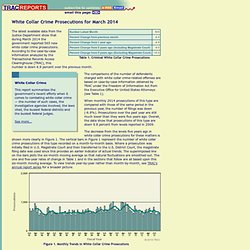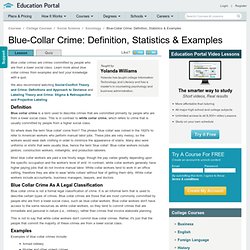

Home. Power crime. Introduction Despite making strides in scrutinizing crimes committed by economically and politically powerful actors, organizations, and even states, the field of criminology remains disproportionately preoccupied with socially vulnerable offenders involved in street crime.

This observation is more than just a vague impression. Examinations of the major US and British journals of criminology and criminal justice reveal that a mere 3% of research articles focus on the criminal activities of corporations and governments [2]. This special issue offers more than just another round of discussion pertaining to so-called white collar criminals. By concentrating on what we call power crime, essays delve into the theoretical and conceptual underpinnings of grave breaches of domestic and international laws. Establishing a common theme for this issue. Power, crime and criminology in the new imperial age. Social Accountability and Corporate Greenwashing. The Sociology of Corporate Crime: An Obituary. White Collar Crime Prosecutions for March 2014.
White Collar Crime Prosecutions for March 2014Table 1.

Criminal White Collar Crime Prosecutions The latest available data from the Justice Department show that during March 2014 the government reported 565 new white collar crime prosecutions. According to the case-by-case information analyzed by the Transactional Records Access Clearinghouse (TRAC), this number is down 6.9 percent over the previous month. The comparisons of the number of defendants charged with white collar crime-related offenses are based on case-by-case information obtained by TRAC under the Freedom of Information Act from the Executive Office for United States Attorneys (see Table 1). When monthly 2014 prosecutions of this type are compared with those of the same period in the previous year, the number of filings was down (-6.9%).
Prosecutions over the past year are still much lower than they were five years ago. Figure 3. White Collar Crime. Blue-Collar Crime: Definition, Statistics & Examples. Blue collar crimes are crimes committed by people who are from a lower social class.

Learn more about blue collar crimes from examples and test your knowledge with a quiz. Definition Blue collar crime is a term used to describe crimes that are committed primarily by people who are from a lower social class. This is in contrast to white collar crime, which refers to crime that is usually committed by people from a higher social class. So where does the term 'blue collar' come from? Most blue collar workers are paid a low hourly wage, though the pay varies greatly depending upon the specific occupation and the worker's level of skill.
National White Collar Crime Center (NW3C) Gangster Bankers: Too Big to Jail. Outrageous HSBC Settlement Proves the Drug War is a Joke. Massey Energy’s Negligence Led to Mine Blast, Study Finds. The report, released on Thursday by an independent team appointed by former Gov.

Joe Manchin III of West Virginia and led by J. Davitt McAteer, a former federal mine safety chief, echoed preliminary findings by federal officials that the blast could have been prevented if Massey had observed minimal safety standards. But it was more pointed in naming Massey as the culprit, using blunt language to describe what it said was a pattern of negligence that ultimately led to the deaths of 29 miners on April 5, 2010, in the worst American mining disaster in 40 years. “The story of Upper Big Branch is a cautionary tale of hubris,” the report concluded.
“A company that was a towering presence in the Appalachian coal fields operated its mines in a profoundly reckless manner, and 29 coal miners paid with their lives for the corporate risk taking.” In a statement on Thursday, Massey Energy’s general counsel, Shane Harvey, disputed some of the report’s findings. Mr. Coming to Grips With Feminicide. Since the completion of our edited book, violence against women who defend human rights is growing at an alarming rate.

Flor Alicia's is one of many cases of relatives threatened or murdered for the human rights activities of their family members. Several of Flor Alicia's relatives, including her mother, are well-known human rights defenders in Chihuahua. Her aunt is Alma Gómez, a long-time women's rights advocate, former state senator and co-founder of Centro de Derechos Humanos de las Mujeres and Justicia Para Nuestras Hijas (Justice for Our Daughters) in Chihuahua.[2] Alma Gómez co-authored one of the chapters for "Terrorizing Women.
" Read more work by Rosa-Linda Fregoso and other writers in the Public Intellectual Project. The violence in Mexico is benumbing. "Mexican armed forces," as journalist Jeremy Kuzmarov notes, "are notoriously corrupt and have an abhorrent human rights record. " Women defenders of human rights are especially vulnerable. Critical Human Rights Framing.